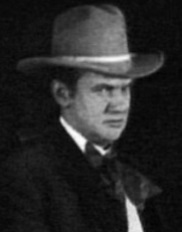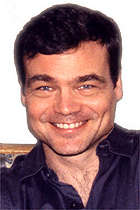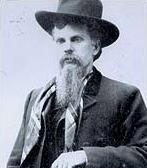
Interpretations – Jesse James

Introduction
The film Frank and Jesse represents Jesse as a good man psychologically-damaged by the war and forced into outlawry by the Banks and the Railroads.
However, it is only one of a number of interpretations of Jesse James and the James Gang.
This spread looks at
six other interpretations.
After you have studied this webpage, answer the question sheet by clicking on the 'Time to Work' icon at the top of the page.
Links:
The following websites will help you research further:
• Jesse James Biography
1: A Folk Song
A folk song, sung from the time of Jesse’s death, but not written down until the 1920s:
Jesse James was a lad who killed many a man
He robbed the Glendale train;
He stole from the rich and he gave to the poor
He'd a hand and a heart and a brain.
Poor Jesse had a wife to mourn for his life,
Three children, they were brave;
But that dirty little coward that shot Mr. Howard
Has laid poor Jesse in his grave.
2: A Children’s Fact-book
From James Horan and Paul Sam: Pictorial History of the WILD WEST (1954):
Now what is the true story of Jesse James? The answer is simply that he was a cold-blooded killer and a thief. There is no credible evidence that he ever gave one cent to a widow, or anyone else in need, or took up arms for the helpless or the downtrodden. For most of his life he was hunted like a wild animal. He survived for sixteen years only because he and his gang could intimidate weak-spined country officials, and could count on the affection of his kissing kinfolk who hid him out.
3: A Son’s Memories
From Jesse James My Father, The First and Only True Story of His Adventures Ever Written, by Jesse Edwards James, son of Jesse James and Zee Mimms James (1899). Jesse Jr. trained as a lawyer, but became an actor, and played in father in two films.
 'I was then six years old. I remember my father as a tall, rather heavily built man, with a dark sandy beard. He was very kind to mother and to sister and to me. I remember best his happy pranks, his fun making and his playing with me …
'I was then six years old. I remember my father as a tall, rather heavily built man, with a dark sandy beard. He was very kind to mother and to sister and to me. I remember best his happy pranks, his fun making and his playing with me …
'My father was at home a great deal of the time. He often took me with him for rides on horseback when the weather was fair… My father used to hold me on his lap and talk a great deal to me about his adventures in the war. He used to talk to me about the James boys, and would read to me the accounts of their adventures that were published in the newspapers…
'I remember that once he showed me a picture of one of the members of the
guerrilla band who was living then, and said laughingly, that he had a good
long neck to hang by .'
4: A Modern Historian
From TJ Stiles’s summary on the internet of his book: Jesse James: Last Rebel of the Civil War (2003):
 'A fresh look at Jesse James reveals a far more purposeful, and important, figure than we thought.
'A fresh look at Jesse James reveals a far more purposeful, and important, figure than we thought.
'Jesse James was a forerunner of the modern terrorist, and was not a Robin Hood. Though he was clearly motivated by money, he and his supporters were very politically-minded, clever, and articulate and Jesse's own comments and letters to the press show he knew about the details of local politics.
'Through his alliance with newspaper editor John N. Edwards, he appealed to
newspapers there to recognize him as a Confederate hero. The bandits
whom Jesse led came out of troubles that followed the war. Former
Confederates were excluded from politics, so the former bushwhackers formed
the resistance to the authorities who ran the state. Their resistance
was direct and violent.'
5: Billy Pinkerton
In 1881, Pinkerton's son Billy gave an interview to the Chicago Times, soon after the Winston train robbery, in which conductor William Westfall was killed. In 1881, of course, the Pinkerton Detective Agency had spent the last ten years trying unsuccessfully to track down Jesse James, and the James Gang had killed a number of Pinkerton Agents.
According to one historian, the account ‘is generally quite accurate, and is particularly valuable as it was delivered while Jesse James was still alive’. What Pinkerton does not mention, however, is that the James Gang killed Westfall because he had helped the Pinkertons attack on the Jameses’ farm in 1875.
'Jesse
James,”' said Mr. Pinkerton, 'is a blood-thirsty devil, and the murder of
Conductor Westfall is just like one of his acts. On several occasions
he has shot down men wantonly, and without the shadow of an excuse.
The Northfield bank cashier was murdered in cold blood, and without cause.
There are other instances of the same kind, showing what kind of a man he
is.
'The gang was made up originally,' began Mr. Pinkerton,
'of Jesse James, Frank James, Cole, John, and Jim Younger, Clel Miller, and
Arthur McCoy. They had acquired an appetite for plunder and crimes
during the war, when they served under Anderson and other noted guerrilla
leaders. After the war they kept on with their lawless work...'.
6: A Journalist's Opinion
From John N. Edwards, Noted Guerrillas, or the Warfare of the Border (1877).
Edwards had fought for the South as a Major in the army during the Civil War, and he supported Jesse through his newspaper The Kansas City Times, glamourised him, and made him famous.
At the same time, of course, he made himself famous, as the friend and publicist of the James brothers.
 'Since 1865 it has been pretty much one eternal ambush for this man – one unbroken and eternal hunt twelve years long. By some intelligent people he is regarded as a myth; by others as in league with the devil. He is neither, but he is an uncommon man…
'Since 1865 it has been pretty much one eternal ambush for this man – one unbroken and eternal hunt twelve years long. By some intelligent people he is regarded as a myth; by others as in league with the devil. He is neither, but he is an uncommon man…
'He does not kill save in stubborn self defence. He has nothing in common with a murderer. He is an outlaw, but he is not a criminal. The war made him a desperate guerrilla, and the robbers who came after it outlawed him and drove him into resistance. He was a man who could not be bullied.
'This is the summing up of the whole history of this man since the war. He was hunted, and he was human. He replied to attack by defiance, ambush by ambush, musket shot by pistol shot, night attack by counterattack, charge by counter-charge, and so he will do, desperately and with splendid heroism, until the end.'